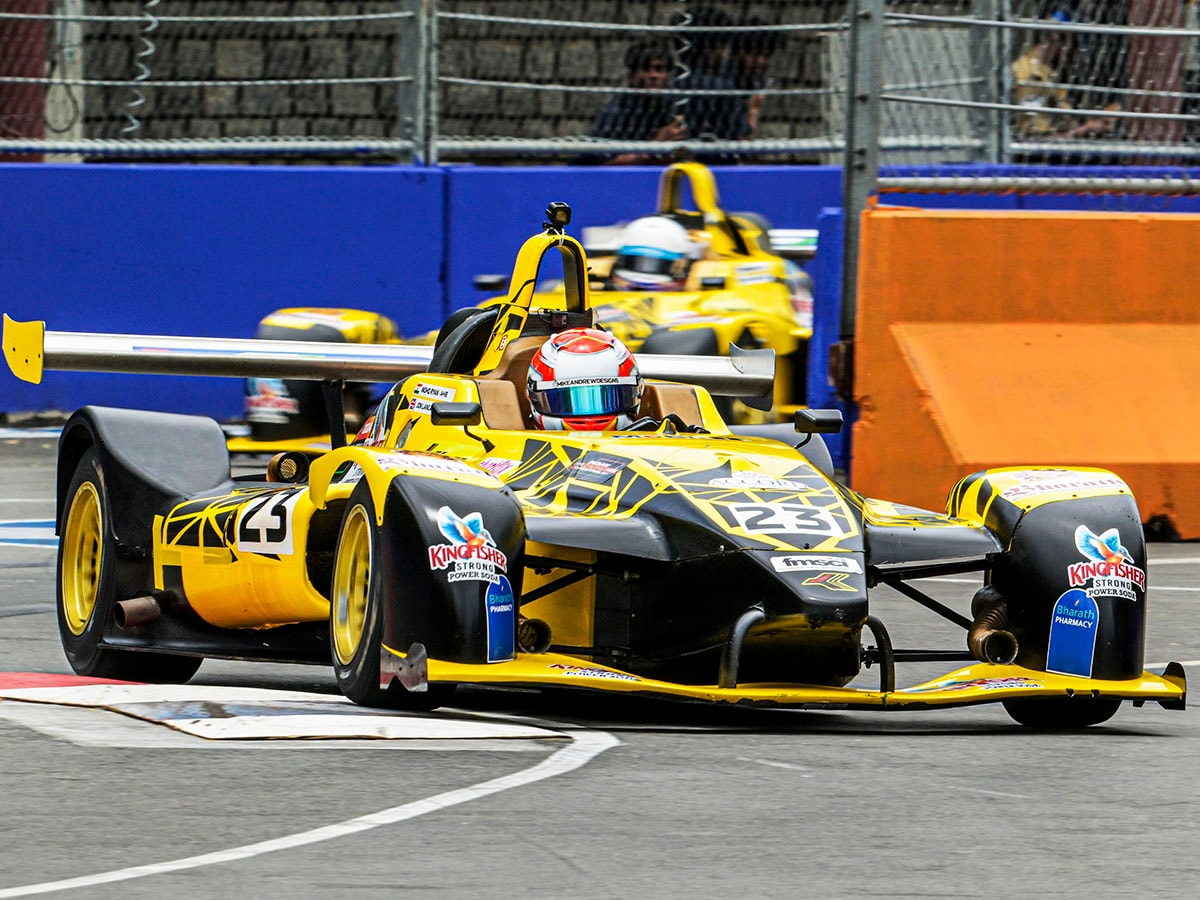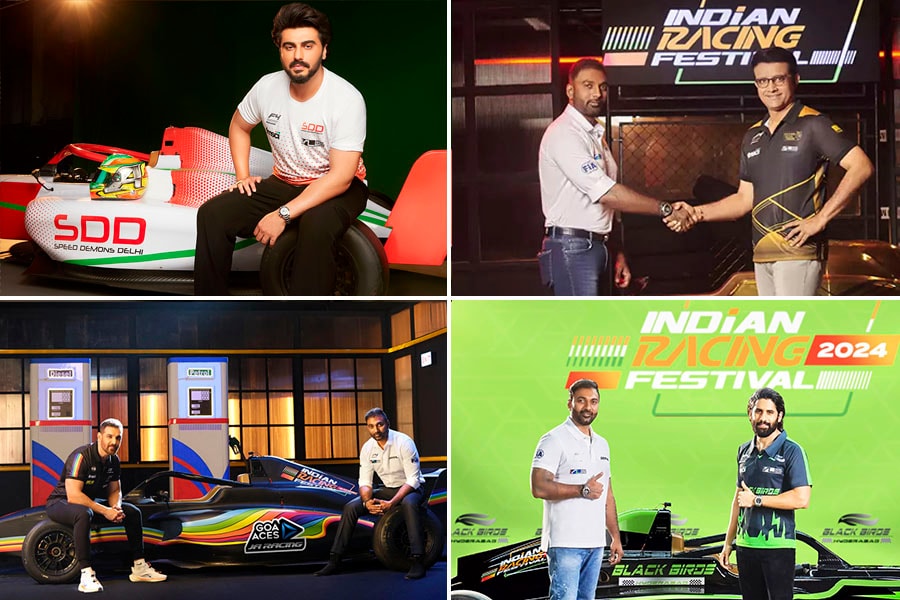 Image: Courtesy Indian Racing Festival
Image: Courtesy Indian Racing Festival
India’s motorsport landscape has revved up with the Indian Racing Festival (IRF). The festival, featuring the Indian Racing League (IRL) and the Formula 4 Indian Championship (F4IC), showcases speed, of course, but also makes a statement about India’s potential in the global motorsport arena. Set against the vibrant backdrop of Chennai, IRF 2024 has brought with it the first-ever Night Street Race in the country and also boasts of celebrity team owners like John Abraham, Sourav Ganguly, Naga Chaitanya and Arjun Kapoor.
The IRF is significant for Indian motorsports as it serves as a platform for showcasing India’s racing talent and is a catalyst for the development of new racing initiatives and circuits across the country. The festival’s highlight, the Night Street Race in Chennai, has managed to attract global attention.
Besides, India’s only four-wheel racing league is also breaking ground as the world’s first gender-neutral racing championship series—it saw Czech racer Gabriela Jilkova become the first woman pole sitter in the Indian Racing League history. “It’s a great honour to be part of such an event. Globally, not many races have both male and female drivers compete with each other. Such leagues are important for the sport to grow,” said Jilkova.
Meanwhile, the F4IC offers young Indian drivers a golden opportunity to gain Super License points, a stepping stone for any racer aspiring to compete on the world stage.
The Economic Impact and Cultural Significance
The economic impact of the IRL is substantial. The event brings in tourists, creates jobs, and increases the city’s visibility on the global stage. As co-founder Abhinandan Balasubramanian points out, “The idea was always to bring motorsports to people, make it more accessible. We have made a one-time investment of around Rs 220 crore to create the street race circuit here. The Night Race, a rare spectacle globally, is a matter of pride for Chennai, showcasing the city’s capability to host world-class events.”
Balasubramanian also emphasises the critical role of government support in making this event possible. “This couldn’t have happened without the support and vision of Chief Minister MK Stalin and all government agencies,” he says. The collaborative effort between the government and private entities is a testament to what can be achieved when there is a shared vision. Also read: ‘Suspense’ of slowest horse race wins new fans in Japan
Balasubramanian is pragmatic about the challenges of building a motorsport ecosystem in India. “This is not a venture-backed business where you need to show 10 times evaluation. Sports requires a certain gestation period,” he explains. The IRF is a long-term investment in India’s sports culture. The success of the event will be measured not just in immediate economic returns but in the sustained growth of motorsports in the country.
What Stakeholders Say
The IRL has a number of high-profile stakeholders one of whom is former India cricket captain Sourav Ganguly. Says the southpaw, who owns the Kolkata Royal Tigers racing team: “As someone who has always believed in pushing the boundaries of Indian sports, my investment in the Indian Racing Festival team Kolkata Royal Tigers stems from a deep passion for motorsports and a desire to see it flourish in our country. The Indian Racing Festival is not just about speed and competition; it’s about building a culture of excellence, nurturing young talent, and expanding the horizons of Indian sports beyond the traditional. Leagues like these are critical because they introduce new avenues for athletes, inspire the next generation, and elevate India’s presence on the global motorsport stage. Through this platform, we aim to create a legacy that excites, engages, and empowers the future of Indian motorsports.” Also read: Why the first ever MotoGP in India was a breakthrough moment for motorsports in the country
Akash Gowda, a driver for Speed Demons Delhi, shares his excitement about being part of the IRF. “It’s a first-ever night race, and they’ve done it really well. The track is fast, the crowd’s amazing, and the experience has been incredible,” he says. Gowda highlights the importance of such opportunities for young Indian drivers. “This is a big boost for motorsports in India. It’s a great opportunity for Indian drivers to get noticed and gain experience.” 
Redefining Sponsorship and Branding in Sports
By integrating the glamour of motorsports with the inclusivity of a gender-neutral league, the IRF presents an aspirational product that resonates with both millennials and Gen Z. The festival offered brands and sponsors a unique opportunity to connect with a young, dynamic, and socially-conscious audience.
Vikram Bahl, chief marketing officer at United Breweries Ltd., the company behind Kingfisher, elaborates on their motivation to sponsor the league. “The excitement around motorsports aligns with Kingfisher’s deep-rooted passion and commitment towards supporting rapidly growing sports in India,” says Bahl. The sponsorship allows Kingfisher to tap into the vibrant motorsport culture in Tamil Nadu, a key market for the brand.
Bahl also underscores how the sponsorship aligns with Kingfisher’s brand values. “Sponsoring IRL was a natural extension of Kingfisher’s brand image, which stands for good times and is known for unforgettable consumer experiences,” he explains. The partnership has been a strategic move to strengthen Kingfisher’s association with motorsport fans, particularly among Gen Z and millennials.
Kingfisher has gone beyond traditional sponsorship by offering innovative fan engagements during the IRL events. From VR game stations to city-wide activations in Chennai, Kingfisher created an immersive experience for fans, making the event more accessible and exciting.
The gender-neutral concept of the IRL is another aspect that Kingfisher supports. “We are all in support of nurturing environments that foster inclusivity,” says Bahl.
With the support of passionate stakeholders—from government bodies to private sponsors—and the enthusiasm of drivers and fans alike, the IRF is set to pave the way for a thriving motorsport culture in India. As the engines roared and the lights shone bright over Chennai’s streets for the Night Street Race, India witnessed the dawn of a new era—one that promises to accelerate the journey towards becoming a global motorsport powerhouse.
